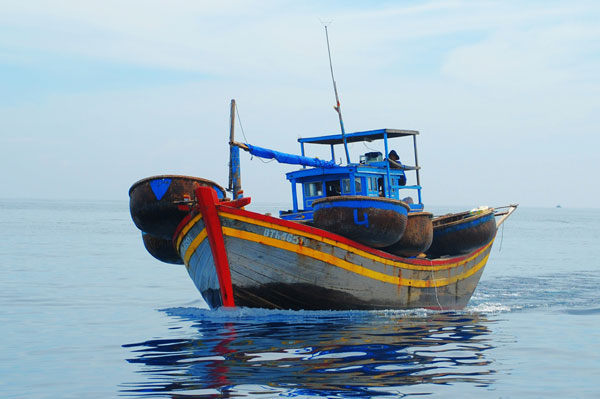Solution to effectively handle oil-contaminated bilge water
Environmental SOS Company (Vietnam Association for Protection and Environment) has successfully proposed and tested the solution of treating oil-contaminated bilge water for water transport vehicles.
This is a simple solution, but brings very high economic efficiency for transport, transport and tourism sectors; At the same time, it contributes positively to environmental protection of agriculture and aquaculture.
This solution uses available SOS-1 oil filter cloth , made into bags. Then connect the bag to the bilge water exhaust pipe before pumping out. For the first time, it is easy to pump water through the bag (maximum 250m 3 / hour on a 1m 2 section ).
After a period of use, the amount of oil clinging to the fabric will gradually reduce the flow of the pump, possibly even causing a blockage. It is time to replace the new filter bag (like using a vacuum cleaner).

Oil cleaning for filter bags is not carried out on the ship. Filter bag after soaking the oil is removed, put into sealed plastic bag and new filter bag is inserted instead.
Oil is easily separated by conventional mechanical measures (such as sugarcane juice), then cleaned and reused. Each time of delivery, the oil filter bag is pressed with 1 hole. When receiving the bag with 4 to press hole, do not continue to use it to filter, but only in the waste water chamber to absorb oil. When worn bags will be destroyed by burning in cement kilns, providing additional heat for the kiln and not harmful to the environment when burning at a temperature of 1400 degrees C.
According to the initial calculation and testing, the cost of treating oil contaminated water for a small / medium sized boat / boat is from 7,000-20,500 VND / day.
The entire cost of organizing the collection and treatment of oil filter bags for boats, led by SOS Environment Company at the port. Ship owners only deliver bags filled with oil, and receive new bags or cleaned bags.
If this solution is implemented on a large scale, surely the provisions in Circular No. 70 of the Ministry of Transport (effective from June 1, 2012) will become a reality. By following the 'National Technical Regulation on Rules of Pollution Prevention by Inland Waterway Vehicles' issued under this Circular, ships must not discharge oil-contaminated bilge water into the environment. Must be collected into containers to pump ashore (or pumped on receiving vessels) for handling; It is not feasible to install an oil separator from the water on the vessel.
If building an oil-contaminated wastewater treatment center on the shore, all ships in the region must also be concentrated to pump oil contaminated water (to the service vessel), or to directly dock to pump water. ashore handling.
Thus, in addition to the costs for wastewater treatment facilities, ship owners also suffer huge economic losses due to travel time and ships have to stop operating, waiting for release of bilge water (every 2 weeks). -3 times).
In Quang Ninh province alone, if the organization of daily wastewater treatment for more than 10,000 boats is operating, it will be extremely difficult and expensive. Moreover, the majority of existing boats in our country are rudimentary, old machinery condition so the oil tank bottom is more serious and the frequency of pumping out oil contaminated water is much higher.
Director of Environmental SOS Company Pham Van Son affirmed that the company can meet the needs of waste oil control under this plan for all cruise ships and fishing vessels in big bays like Ha Long, Nha Trang and Kien Giang.
- What to do when drinking water is contaminated
- Contaminated water at Fukushima enters groundwater
- How to handle when the car
- Millions of Bangladeshis have to use contaminated water daily
- Panic because of water poisoning
- How much arsenic in water is dangerous?
- Japan: 1.6 million tons of contaminated water seeps into the ground
- To know if the water is contaminated with arsenic
- 300 tons of contaminated water leaked out
- WUSTL University develops nanofiltration membrane, water filter, simple, cheap
- Discovered more leakage of contaminated water in Fukushima 1
- Contaminated water is flowing into the Fukushima building 1
 'Barefoot engineer' invents a pipeless pump
'Barefoot engineer' invents a pipeless pump Process of handling dead pigs due to disease
Process of handling dead pigs due to disease Radiometer
Radiometer Warp Engine: Technology brings us closer to the speed of light
Warp Engine: Technology brings us closer to the speed of light